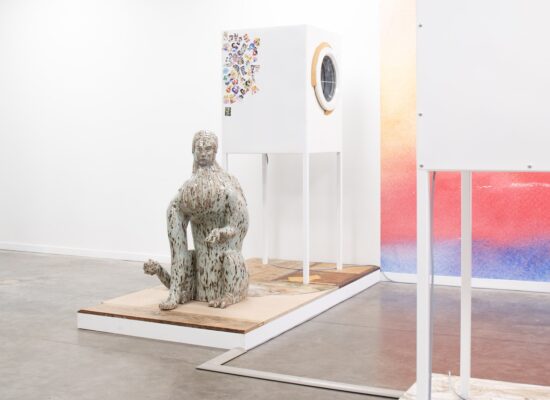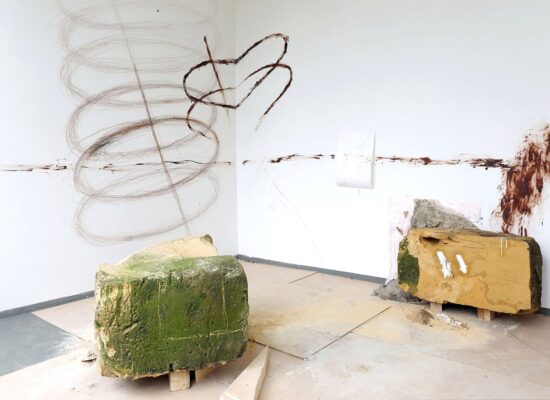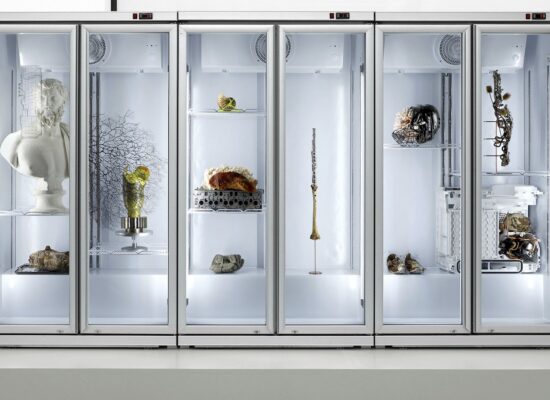Lives in Antwerp, Belgium
Website https://www.williamludwiglutgens.com
How do you describe your own art practice?
Describing my art practice has always been challenging for me. What happens is on an unconscious level, and the reading or interpretation comes mostly afterward. But I do start from an idea, a drawing, an anecdote, or a joke. However, I am a multidisciplinary painter who primarily creates figurative work. At times, I wish I could create abstract work because it seems freer and less constraining. Despite my attempts to move away from figuration, it keeps resurfacing and remains central to my practice. I have a recognizable drawing line, which I think has a powerful idiosyncratic value and is something I feel more and more I shouldn’t downplay or hide. It took me some time to consider this. Language is also important in my practice. I enjoy giving titles and sometimes even mislead the viewer by doing so. Besides painting and drawing, I make sculptures and installations, and more recently, I am diving into performative work and film. Thus, multidisciplinary. My practice is studio-related, but I can also work on-site, and I often collaborate with others, which opens up the lonely painter’s practice.

Artist made fractured paper, spray paint, oil paint, expanding foam, bone glue on canvas and stained wood
202,6 cm x 284,8 cm
Which question or theme is central in your work?
I’ve realized that I am a psychological being (like everyone), and initially, I felt that discussing psychological and/or autobiographical (for lack of a better term) anecdotes, dreams, and fantasies through my work would be seen as egocentric and uninteresting for an audience. Why would my experiences be important? So I kept the source of my work more or less hidden and vague, out of some kind of shame, actually, unworthiness. But my work is very much about the ego and the psyche, which is a universal theme, and how that situates or reflects upon our realm. I guess I express my insecurities in some sense. The playfulness of the work camouflages something darker, and I hope an audience would take the time to read the symbolism in my work, to reflect and contemplate on the self, our society, and the influence of images, media, and representations that shape our understanding of reality. This could be related to bodies and freedom, masculinity, achievement-driven society, depression, self-care/maintenance, and so on. This is where my intention lies, I think.
Additionally, I have been delving into psychoanalysis. This has set me on a path of navigating through memories in relation to my unconscious and behaviors, ultimately realizing that I am expressing these things in my work. For example, I grew up in a neoliberal environment, which is why I think I often mock men in ties. Enjoyment in suffering is something present in my work. I’m curious about the concept of jouissance. For instance, a longing for the end of the world, or going to an art fair; we hate it, but for some reason, we want to be part of it. Although I can only grasp a small part of it, this exploration of attraction and menace excites me. I would like to name a project ‘Joy Sauce.’ My partner, Anna Laganovska, and I have been laughing about this name because I had difficulty pronouncing ‘Jouissance’. I guess my work is also humorous.

Installation of 7 sculptures, sound, mixed media, wall text by Anna Laganovska,
variable dimensions, Collection of SMAK.
What was your first experience with art?
My first memories about art are very much scattered and in a non-chronological order in my head. Some memories make me think I’m 8 and standing in a Parisian museum staring at Manet, but I might have been 5 or 11 instead. Most of those experiences have to do with my mother. She fed me with the Impressionists and later Neo-Expressionists. We all know the names. She put me in drawing classes since I was at least 6. I remember being in a class where I was the youngest, only boy, surrounded by older girls who were already teenagers. It was uncomfortable.

oil paint on textiles, mixed media, sound (text piece by Wouter Poolman), variable dimensions
What is your greatest source of inspiration?
Insomnia.

Aquarelle, graphite, and oil paint on rice paper, mounted on stained wood, 45.8 x 37.9 cm.
What do you need in order to create your work?
An idea.

spray paint on aluminium off-set plates, 316,5x 241,5cm
What work or artist has most recently surprised you?
Joan Jonas, Camille Henrot, Micheal Stevenson, Sarah Lucas, Karlo Kacharava, Jeremy Deller.

Supported by Kunstplaats VONK.




